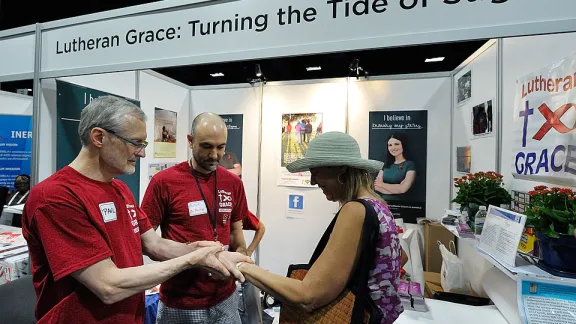
Volunteers offer a visitor a temporary tattoo at the
ELCA Program Makes a Difference
A speaker in a lime-green vest bellowed about HIV with the energy of a carnival barker, while Lutheran volunteers patiently greeted a stream of participants in the Faith Zone of the Global Village at the 19th International AIDS Conference in Washington, D.C.
The Lutheran Grace (GRowing AIDS Compassion Everywhere) team was part of the community of educators, caregivers and people with HIV who had come to the U.S. capital 22-27 July to try and “turn the tide” against AIDS.
For the Lutheran Grace volunteers—who are from the Metro DC Synod of the Evangelical Lutheran Church in America (ELCA) and Lutheran Social Services of the National Capital Area—it was a matter of keeping the faith.
Flanked by posters that read “I believe in an end to stigma” and “I believe in dignity,” they collected prayers for people living with HIV, explained their mission, and adorned willing listeners with bright Lutheran Grace wash-off tattoos.
“Lutheran Grace’s goal is to normalize the discussions around HIV and AIDS, and make our churches welcoming places for people living with HIV,” explained Martha Jewett, a parish nurse at Christ Lutheran in D.C.
In a letter before the conference, ELCA’s Presiding Bishop Mark S. Hanson had welcomed faith delegates to AIDS 2012 alongside Episcopal Presiding Bishop Katharine Jefferts Schori, urging them to make the event a defining moment in the history of engagement with HIV and AIDS.
Lutheran Grace’s focus was to get people involved in this defining moment, which gathered 20,000 international leaders on HIV for intense strategizing and collaboration, according to Jewett.
In order to connect members of their respective congregations and AIDS 2012 delegates, the group asked DC-area Lutherans to write down prayers for or concerns related to people living with HIV, which they shared with visitors to their Faith Zone booth. Delegates were invited to pass on names of people living with HIV, greetings, artwork or prayer concerns to the faith communities supporting Lutheran Grace.
Jewett said that after AIDS 2012 members of Lutheran Grace were going to share with their congregations the prayers and petitions they had collected in the Faith Zone as a way to engage children, youth and adults about stigma reduction, and HIV and AIDS.
The ELCA is a member church of the Lutheran World Federation (LWF). The LWF seeks to empower the Lutheran communion to respond competently and effectively to the HIV epidemic. The LWF has sent a delegation to AIDS 2012 and the Interfaith Pre-Conference on HIV.
That the volunteers at Lutheran Grace were a mixture of lay and clergy members from 25 different local congregations was a sign that “HIV concerns have found their way into the hearts of the congregation members and their leaders,” noted Rev. Dr Veikko Munyika, a member of the LWF delegation and LWF AIDS Desk coordinator for the past four years.
“Every church can help reduce stigma by having programs to learn about HIV and AIDS, how stigma prevents people from getting tested and treated, how stigma makes them feel isolated and alone, how it increases their suffering, and makes them deny they could be at risk for HIV,” Jewett said.
“I’m a Lutheran, and I’m a Lutheran who lost a brother to AIDS,” said Lutheran Grace volunteer Nettie Horne. “He died in 2000, and he believed that the church–in the abstract–was against people like him. We know that’s not true in our church, and we need to do a better job of communicating.”
In 2009, the Church Council of the ELCA adopted the “ELCA Strategy on HIV and AIDS,” which aims to halt the spread of HIV through effective prevention, treatment, and care; eliminate the stigma and discrimination experienced by people living with HIV; and reduce the conditions of poverty and marginalization that contribute to the spread of HIV.
The Lutheran Grace volunteers such as Craig Shireman are making this strategy a reality at the local level.
“I feel it is important, as an ELCA member, to let people know that we care about HIV and other challenges such as tuberculosis, and that they affect us—not just Americans, but the entire world,” he remarked.
“People living with HIV are the people next to us, who we love and know; we just now know their status,” said fellow volunteer Kay Swift of Georgetown Lutheran Church. “Our representation here at AIDS 2012 is to pray for all the people who are working in care and prevention, and the people living with HIV themselves.”
(A contribution by Ecumenical Media Team member Jon Pattee)


